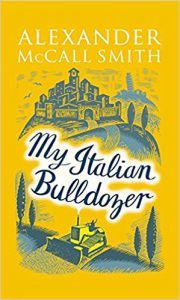Search the Blog
Categories
- Books & Reading
- Broadband Buzz
- Census
- Education & Training
- Friday Reads
- General
- Grants
- Information Resources
- Library Management
- Nebraska Center for the Book
- Nebraska Libraries on the Web
- Nebraska Memories
- Now hiring @ your library
- Preservation
- Pretty Sweet Tech
- Programming
- Public Library Boards of Trustees
- Public Relations
- Talking Book & Braille Service (TBBS)
- Technology
- Uncategorized
- What's Up Doc / Govdocs
- Youth Services
Archives
Subscribe
Tag Archives: Friday Reads
Friday Reads: Death and the Virgin Queen: Elizabeth I and the Dark Scandal That Rocked the Throne
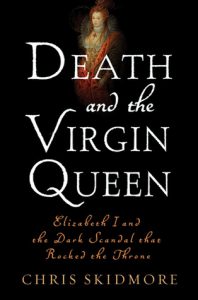 The circumstances surrounding Amy Robsart’s death in 1560 have haunted historians for more than 450 years. Was she pushed down the stairs or did she trip and fall? Was she poisoned and her body positioned to look like an accident? Death and the Virgin Queen: Elizabeth I and the Dark Scandal That Rocked the Throne by Chris Skidmore attempts to answer these questions. Skidmore argues that his reexamination contemporary records, as well as the long-long coroner’s report of Amy death and a contemporaneous journal kept by an unknown individual, sheds new light on this enduring mystery.
The circumstances surrounding Amy Robsart’s death in 1560 have haunted historians for more than 450 years. Was she pushed down the stairs or did she trip and fall? Was she poisoned and her body positioned to look like an accident? Death and the Virgin Queen: Elizabeth I and the Dark Scandal That Rocked the Throne by Chris Skidmore attempts to answer these questions. Skidmore argues that his reexamination contemporary records, as well as the long-long coroner’s report of Amy death and a contemporaneous journal kept by an unknown individual, sheds new light on this enduring mystery.
Robsart’s passing would have attracted little attention if she had not been the wife of Elizabeth I’s favorite courtier Robert Dudley. In the months and years leading to Robsart’s fatal fall, Dudley rarely left Elizabeth’s side. In fact, rumors swirled not only through the English court, but through other European courts as well, that Elizabeth and Dudley were engaged in a passionate affair. While Dudley attended to England’s queen, Robsart lived a quiet, but transient life – staying with friends and family because the Dudleys lacked a permanent home. Dudley rarely visited Robsart, but made sure she never lacked for funds and other necessities.
Why the mystery then? Skidmore suggests that Robsart’s death was long expected by members of Elizabeth’s court. Prior to Amy’s death, rumors had circulated that she was in poor health and/or she was being poisoned. Skidmore cites several instances where courtiers and foreign ambassadors speculated that once Dudley was free of his wife, he would marry Elizabeth I. The circumstances surrounding Amy’s sudden passing become murkier when Skidmore reveals that Elizabeth mentioned Robsart’s death to the Spanish ambassador prior to it becoming public knowledge.
Skidmore focuses his examination primarily on Dudley – his motives and how he might have carried out this deed. Despite the introduction of new documents and a reinterpretation of existing facts, Skidmore fails to provide additional insight into Robsart’s death. The basic facts are unchanged: Robsart’s body was found at the bottom of a short flight of stairs. She encouraged the household to attend a nearby fair, leaving the house largely empty. Perhaps if Skidmore had looked at suspects beyond Robert Dudley, he would have brought something new to the table. For example, other courtiers such as Dudley’s enemy Sir William Cecil could have arranged for Robsart’s death in order to tarnish Dudley’s reputation. However, Skidmore successfully demonstrates that Robsart’s mysterious death colored people’s treatment of Dudley, as well as destroyed any chance of marrying Elizabeth. Ultimately, too much time has passed and too little evidence has survived for this mystery to be solved.
Friday Reads: A Year in Review
The NLC staff have done a lot of reading this year! We wanted to take a look at all the great books we’ve reviewed in 2017.
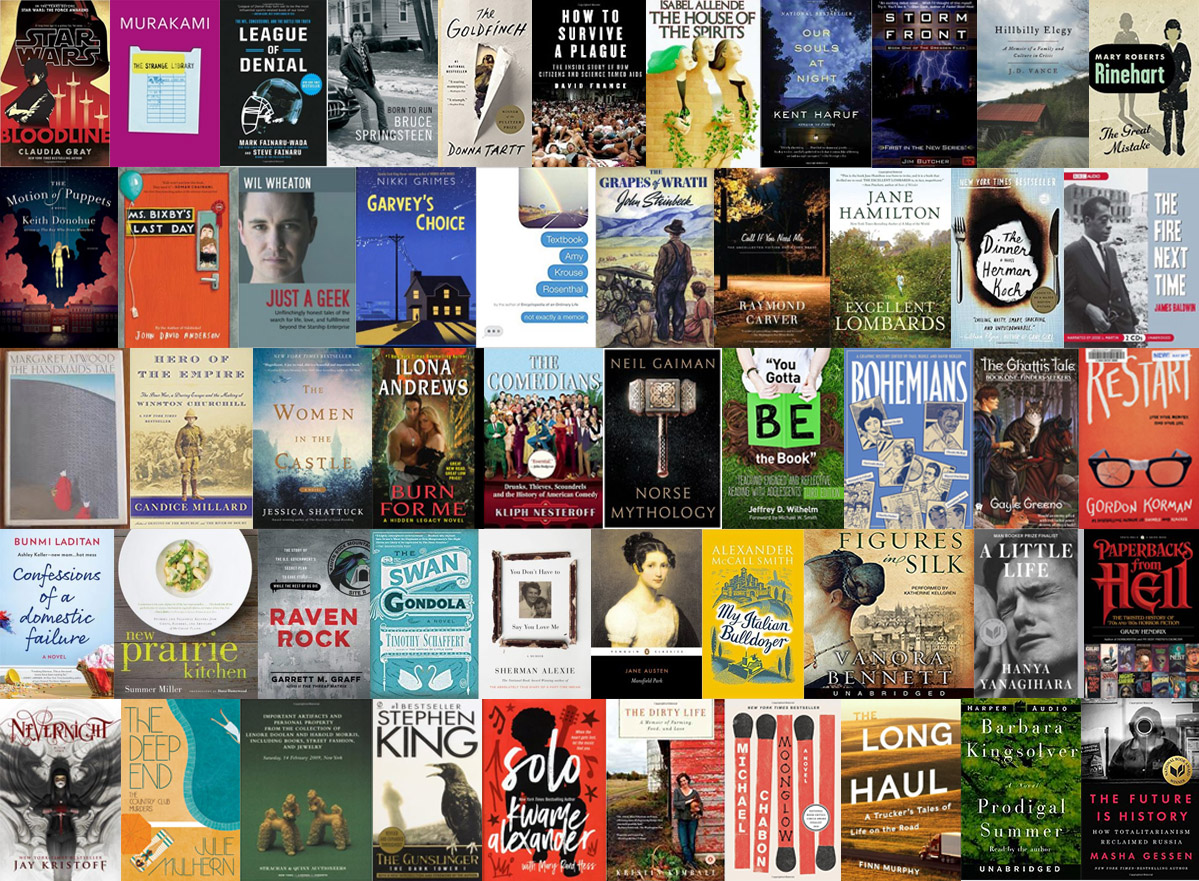 You might be familiar with our weekly blog series Friday Reads; every Friday, a staff member at the Nebraska Library Commission posts a review of a book. From memoirs to science fiction, murder mysteries to home organization, we’ve shared what we’ve read and why we’ve read it.
You might be familiar with our weekly blog series Friday Reads; every Friday, a staff member at the Nebraska Library Commission posts a review of a book. From memoirs to science fiction, murder mysteries to home organization, we’ve shared what we’ve read and why we’ve read it.
Former NLC staffer Laura Johnson created this series to model the idea of talking about books and to help readers get to know our staff a little better. Readers advisory and book-talking are valuable skills for librarians to develop, but they are ones that take practice. We hope that our book reviews will start a conversation about books among our readers and encourage others to share their own reviews and recommendations.
The series has been going strong for 3 1/2 years and has produced over 150 reviews, which are archived on the NCompass blog (http://nlcblogs.nebraska.gov/nlcblog/tag/friday-reads/,) or you can browse a list of reviews here: http://nlc.nebraska.gov/ref/BookReviews.aspx.
Posted in Books & Reading, General
Tagged Friday Reads, Reading, Staff Picks, Year in Review
Leave a comment
Friday Reads: The Future is History: How Totalitarianism Reclaimed Russia, by Masha Gessen
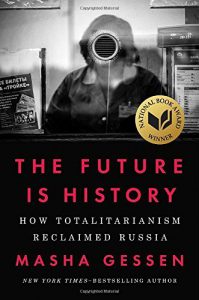 Just over a month ago, on November 15, Masha Gessen’s The Future is History: How Totalitarianism Reclaimed Russia won the 2017 National Book Award for Nonfiction. Since my knowledge about Russia, which has been omnipresent in the news lately, is lacking, and since I’ve had positive experiences with nonfiction National Book Award winners in the past, I tracked down a copy. I’ve been working my way through it ever since.
Just over a month ago, on November 15, Masha Gessen’s The Future is History: How Totalitarianism Reclaimed Russia won the 2017 National Book Award for Nonfiction. Since my knowledge about Russia, which has been omnipresent in the news lately, is lacking, and since I’ve had positive experiences with nonfiction National Book Award winners in the past, I tracked down a copy. I’ve been working my way through it ever since.
Gessen, a journalist and LGBT rights activist, was born in Russia in 1967 and immigrated to the United States with her parents and siblings in 1981. After the collapse of the Soviet Union in 1991, she returned to Moscow, eager to report on new freedoms and opportunities in what appeared to be an emerging democracy. She returned to the United States in 2013, when anti-gay legislation and rhetoric posed a serious threat to her, personally, and to her rights as a gay parent.
The task Gessen sets for herself in this book is to document not only what has happened in Russia over the last 30 years, but also to explore the how and the why. As she states in her prologue, she wanted to tell the story of “[t]he crackdown, the wars, and even Russia’s reversion to type on the world stage,” but also “to tell about what did not happen: the story of freedom that was not embraced and democracy that was not desired.”
She does this in part by tracking the lives of seven real people (her “main characters” or “dramatis personae”). Four were born in the early- to mid-1980s, just before Mikhail Gorbachev declared glasnost (openness) and perestroika (restructuring). Their stories allow Gessen “to tell what it was to grow up in a country that was opening up and to come of age in a society shutting down.” The other three were older intellectuals—a psychoanalyst, a sociologist, and a philosopher–“who had attempted to wield [the intellectual tools of sense-making], in both the Soviet and post-Soviet periods.”
I’m usually all about the personal stories used to bring historical and political nonfiction to life. In The Future is History, however, I’m actually more taken with the expository writing that appears between check-ins with Gessen’s protagonists. That’s because Gessen, with her reporter’s background, is just so good at explaining complicated social, political, and historical dynamics.
There’s no way to provide an adequate synopsis of this book’s content in a six-paragraph blog post. But, if you’re like me and have only superficial knowledge of the subject matter, I can almost guarantee that time spent with The Future is History will pay huge dividends in terms of your Russian literacy. And given the current news cycle, you will start reaping the rewards immediately. My investment has paid off several times already – and that’s just in the last week!
Friday Reads: Prodigal Summer by Barbara Kingsolver
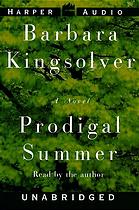 A colleague suggested Barbara Kingsolver’s Prodigal Summer for a recent road trip. She said the book was a great read and the audio version narration was excellent. I hadn’t read any of Kingsolver’s books and was glad to have this recommendation. As it turned out, it was after the road trip that I finally got around to listening to it. While not at all typical of what I usually read – I set aside the most recent Lee Child novel – it turned out to be an excellent recommendation.
A colleague suggested Barbara Kingsolver’s Prodigal Summer for a recent road trip. She said the book was a great read and the audio version narration was excellent. I hadn’t read any of Kingsolver’s books and was glad to have this recommendation. As it turned out, it was after the road trip that I finally got around to listening to it. While not at all typical of what I usually read – I set aside the most recent Lee Child novel – it turned out to be an excellent recommendation.
Kingsolver is noted for her focus on the interaction between humans and their communities and environments. Those subjects are notable in Prodigal Summer. The book’s setting is the forested mountains and farmland of southern Appalachia. Kingsolver blends three interconnected stories – a reclusive wildlife biologist devoted to protecting the environment, a young recently widowed farmer’s wife, and two elderly feuding neighbors. The ecosystem is central and common among these stories, as is a den of coyotes. Over the course of a long summer, the stories of these characters develop and interconnect. A relationship develops between the biologist park ranger and a hunter. There are encounters and relationships between and among the young farm wife and her deceased husband’s family members, and there is the back and forth banter between the elderly neighbors – a man and a woman.
I especially enjoyed the audio narration and dialogue. Kingsolver is the narrator. Her narration enhances the book with her ability to voice the richness of the regional dialect. Kingsolver grew up in rural Kentucky. She knows what she speaks. Her well-crafted and witty dialogue further enrich the book.
Prodigal Summer was published in 2000. It is the fifth of Kingsolver’s seven novels. Her books also include essays, poetry, and nonfiction works.
Friday Reads: The Long Haul
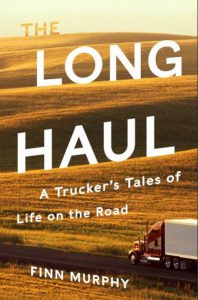 If you are looking for a quick, easy, and entertaining read, The Long Haul might fit the bill. I chose to read it because I was interested in learning more about the life of a long haul trucker, how life on the road is for the drivers, and how they deal with all that traffic. While The Long Haul offers insight into those things, it also is a bit more than that. Author Finn Murphy has an entertaining way of telling stories. Murphy started as a mover, working for a small company in Connecticut. After a few years in college, he dropped out to work full time as a “bedbugger”, a long haul truck driver who moves people. Murphy aptly tells the trucker’s tales, but also describes the unique challenges associated with doing higher profile corporate moves. Some of the stories are comedic, some tragic, and others offer commentary on social classes. In many cases, Murphy describes the typical corporate client (highbrow) often treating the mover (perceived lowbrow) in a crappy way and the mover providing a subtle, but non-harming method of revenge.
If you are looking for a quick, easy, and entertaining read, The Long Haul might fit the bill. I chose to read it because I was interested in learning more about the life of a long haul trucker, how life on the road is for the drivers, and how they deal with all that traffic. While The Long Haul offers insight into those things, it also is a bit more than that. Author Finn Murphy has an entertaining way of telling stories. Murphy started as a mover, working for a small company in Connecticut. After a few years in college, he dropped out to work full time as a “bedbugger”, a long haul truck driver who moves people. Murphy aptly tells the trucker’s tales, but also describes the unique challenges associated with doing higher profile corporate moves. Some of the stories are comedic, some tragic, and others offer commentary on social classes. In many cases, Murphy describes the typical corporate client (highbrow) often treating the mover (perceived lowbrow) in a crappy way and the mover providing a subtle, but non-harming method of revenge.
I’d say Murphy is a more sophisticated individual (he listens to Fresh Air interviews by Terry Gross while on the road) although he is working in what is generally thought of as a lower brow job (moving home furnishings and driving a truck). But Murphy also describes the importance of manual labor, from both a societal and personal perspective. A relatable quote from The Long Haul: “Many young male neurotics find out early that hard labor is salve for an overactive mind.” I’d argue that this often applies to older individuals also, and not just males. Likewise, on the value of manual labor: “Hard work temporarily shut down the constant movie running in my brain that looped around in an endless cacophony of other people’s expectations, obligation, guilt, anger, and rebellion.” I feel the same way about manual labor, but would add that reading a book or doing something relaxing like having a drink and watching birds, butterflies, or flowers equally works to dampen these things down. But I think I’d say rather simply that those things are just good for the soul.
Friday Reads: “Moonglow: A Novel” by Michael Chabon
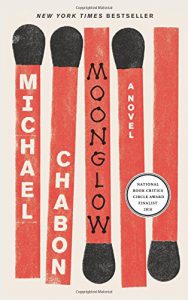 I had almost finished this book when I came to the realization that it was a novel. I knew that Chabon had visited his grandfather in the last weeks of his life. And as I read the book, the tale unfolded like a series of revelations about his grandfather and his family, with rich details that made me believe that at least some of this story must be true. I’ve been a fan of Chabon ever since I devoured his book “Telegraph Avenue” a few years ago, and I looked forward to learning more about him and his life through this “memoir.” How did I not notice that the book is titled “Moonglow: A Novel?” It doesn’t really matter. I think I did actually learn a lot about him.
I had almost finished this book when I came to the realization that it was a novel. I knew that Chabon had visited his grandfather in the last weeks of his life. And as I read the book, the tale unfolded like a series of revelations about his grandfather and his family, with rich details that made me believe that at least some of this story must be true. I’ve been a fan of Chabon ever since I devoured his book “Telegraph Avenue” a few years ago, and I looked forward to learning more about him and his life through this “memoir.” How did I not notice that the book is titled “Moonglow: A Novel?” It doesn’t really matter. I think I did actually learn a lot about him.
The obvious love and admiration for his grandparents shone through. They were definitely “characters,” and I loved them for their passion and quirkiness from the very beginning. His grandfather’s life (as he relates it to Chabon) is fascinating and unpredictable. Bouncing from his time in Europe during WWII to life in mid-century America, this story helps illuminate the experiences of the Grand Generation. Although most people would agree that the story he tells is far from typical—he was actually involved in rocketry and the space program, while most people of his day just watched from afar.
Throughout the book I kept thinking of this book as an episode of the PBS show, “Finding Your Roots”—one of the episodes where the subjects start out with a pretty good idea of what their family and ancestral history might be and then finds out that there are surprises in the family tree. Like the searcher in those TV shows, the reader is compelled to revise their thinking about the characters in this book several times and one can see Chabon the grandson revising his family narrative in his own head as “the plot thickens.”
I credit Chabon with first-class beautiful writing, as well as telling a first-class compelling story. His reflections on himself as a young (ish) storyteller and his grandfather as an older storyteller are very revealing: “…it seemed to be in the nature of human beings to spend the first part of their lives mocking the clichés and conventions of their elders and the final part mocking the clichés and conventions of the young.” The publisher describes this book as, “A lie that tells the truth, a work of fictional nonfiction, an autobiography wrapped in a novel disguised as a memoir.” I encourage you to read it and see what you think.
“Moonglow: A Novel” (Harper, 2017) by Michael Chabon
Review by Mary Jo Ryan.
#FridayReads
Friday Reads: The Dirty Life by Kristen Kimball
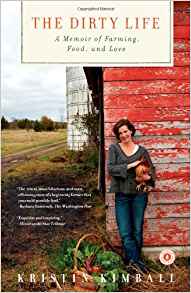 I have a secret obsession with farming. I have no delusions that I could actual be a farmer -I keep a small garden in the summer months, but I’m not a morning person, and prefer to keep my fingernails clean. However, I love to read tales of those who decide to take the plunge and live off the land. My latest foray into the realm of the modern homesteader was The Dirty Life: A Memoir of Farming, Food, and Love by Kristin Kimball.
I have a secret obsession with farming. I have no delusions that I could actual be a farmer -I keep a small garden in the summer months, but I’m not a morning person, and prefer to keep my fingernails clean. However, I love to read tales of those who decide to take the plunge and live off the land. My latest foray into the realm of the modern homesteader was The Dirty Life: A Memoir of Farming, Food, and Love by Kristin Kimball.
A New York City journalist, Kimball heads to rural Pennsylvania to interview an organic farmer about food trends. Despite her big-city lifestyle, she falls in love with the farmer and his dream of community-supported agriculture. Soon she’s traded her studio apartment in the East Village for a ramshackle house upstate, sans electricity, while she and the farmer search for land upon which to build his bucolic vision. She ditches 90% of her belongings, begins raising chickens, and gets engaged on a mountaintop. And that’s Chapter 1.
The rest of the book spans the first year of Kimball’s life with the farmer, as they find their land and begin the process of creating a self-sustaining farm, planning their wedding, and convincing their new community of the value of local, organic food. It’s full of the pastoral details I adore in print (but would run from screaming in real life I’m sure!): misbehaving roosters, tomato plants as tall as trees, Amish auctions, and a runaway team of horses. Kimball’s training as a journalist serves her well; I could smell the dirt and the vegetation and the life on the farm. As a good book should, it made me sad when I reached the last pages, but I’ll tuck it onto my bookshelf, knowing that I can visit the farm any time I want.
Kimball, Kristen. The Dirty Life: a Memoir of Farming, Food, and Love. New York: Scribner, 2010.
Friday Reads: Solo by Kwame Alexander
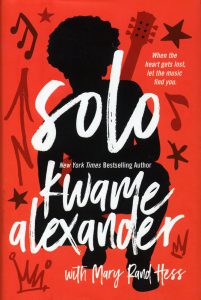 Written in free verse, we meet Blade, who is almost 18, and the son of a famous rock star. His father is now more famous for his crazy acts while drunk or on drugs. His older sister is still supportive of their father, but not Blade, not anymore. On the day of his high school graduation, when he was ready to address the students and parents, his father created a spectacle by running a motorcycle into the stand. That evening his sister reveals that Blade was adopted.
Written in free verse, we meet Blade, who is almost 18, and the son of a famous rock star. His father is now more famous for his crazy acts while drunk or on drugs. His older sister is still supportive of their father, but not Blade, not anymore. On the day of his high school graduation, when he was ready to address the students and parents, his father created a spectacle by running a motorcycle into the stand. That evening his sister reveals that Blade was adopted.
And in no time he is on his way to Ghana, to find his birth mother. She is from the U.S. but is working in Ghana, to make a difference. Blade has much to sort through— the death of his adoptive mother when he was about 10, his father’s behaviors, his girlfriend cheating on him, meeting his birth mother, the people he has met in Ghana, and his nightmares that won’t let go. A look at the cathartic moments in the main character’s life, and what it reveals of his true self. Amazing.
Alexander is one of my favorite authors, and this title is one more of his I greatly enjoyed.
Friday Reads: The Dark Tower: The Gunslinger
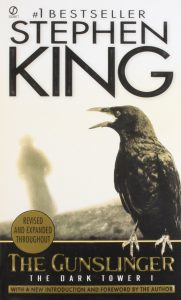 With the recent release of The Dark Tower movie, I decided to finally start reading the Stephen King series that the movie is based on.
With the recent release of The Dark Tower movie, I decided to finally start reading the Stephen King series that the movie is based on.
So far, I’ve only read the first book in the Dark Tower Series, The Gunslinger. I really liked the feel of the book, which was a mixture of locations – western? but with magic? far into our own future after a major unknown apocalypse? alternate history? parallel universe? Unfortunately, by the end of the first book, you still don’t know exactly where or when you are.
So, of course now I’m hooked and have to continue reading to find out what’s really going on. Why is Roland, the last Gunslinger, chasing the Man in Black? Who is the Man in Black…really? What is the Dark Tower? Who is this strange boy Jake, who seems to know a lot about our reality and time, but seems to have some memory loss? Does he belong in this realm or ours?
Although it is the first book in the series, The Gunslinger was a bit disjointed in introducing the characters, location, and plot. It felt like you should already know something about this place before reading this book, but you don’t. And it has an almost annoying ‘non-ending’, in that its tale isn’t resolved, so you do have to continue with the rest of the books to get the full story. Good job on sucking us in, Stephen King!
Luckily, I was able to finish the book before I saw the movie. It was very interesting to match up the parts of the movie that came from the first book in the Dark Tower series. But, I did know that there were also parts of the movie that were pulled from other books in the series, so I kind of got some spoilers, but I don’t think any of them have ruined my desire to keep reading.
I know the movie has received some bad reviews. But, after my reading of The Gunslinger, I think there is so much to the world of the Dark Tower, that it is just too difficult to squeeze it all into one film. That’s why I’m glad that there are talks about a TV series being done. I think that will do a better job of representing the books.
I recommend reading the books and watching the movie. They are both similar and different from each other, and I enjoyed them each for what they are.
Friday Reads: Important Artifacts… by Leanne Shapton

This is a story about a relationship coming together and then falling apart. It’s a very unusual book by Leanne Shapton, with a very long title: Important Artifacts and Personal Property from the Collection of Lenore Doolan and Harold Morris, Including Books, Street Fashion, and Jewelry.
The story is told through the format of an auction catalog, and items are presented in the order they would have mattered in the relationship—a pair of vintage salt and pepper shakers given as a gift, a pair of snowshoes worn on a winter vacation, leftover jars of homemade jam that the couple gave out as holiday presents. Often the items are accompanied by pictures of Lenore or Harold wearing or using the item. Some ephemera, such as opera programs or wedding invitations, bear scribbled conversations between the couple, and these are very telling. Also illuminating are the inscriptions inside the books given to each other as gifts.
Our characters have tastes refined enough to pass judgment on, without having to feel mean about it. These are the sort of things people buy selectively when they have more taste than money—shoes from Prada and Louboutin, toiletries from Chanel and Kiehl’s, clothes from Sonia Rykiel and John Galliano. Even the second-hand items are of good provenance—an Elsa Schiaparelli coat from a shop in Greece that someone may have said once belonged to the famous Maria Callas (someone else may have believed it—I’m reminded of the scene in Desperately Seeking Susan where the vintage shop owner tells Roberta that Susan’s jacket once belonged to Jimi Hendrix).
Each object could be expounded upon, so I’ll go for those porcelain poodles on the cover, given to Lenore by Harold. It’s been made clear in the book, previous to arrival of these dogs on page 68, that Lenore wants a dog—and that Harold doesn’t. Who thinks it’s cute to buy someone little dog figurines, as a gift, when that person really wants a real live dog, and might be thinking they’re actually going to get a dog for a present instead? Someone in touch with the recipient’s tastes but not their desires. Yes, a dog is horrible gift, and yes, Lenore had no reason to expect a dog was a possible gift. But I know how dog owners think, and it occurred to her that she was going to get a puppy as a present, and she would have taken that puppy as a good sign about their relationship. This is a good example, then, of what was wrong with this relationship: a couple that likes the same things (objects) but doesn’t love the same things (experiences, pursuits, achievements).
This is a very unique way to tell a story, especially a love story. It’s a comment on commercialism, on aspirational consumerism, on the expression of identity through objects. But beyond that, it’s engaging—we really do get a sense of these people, and we care about them, just based on photos and descriptions of their possessions.
Shapton, Leanne. Important Artifacts and Personal Property from the Collection of Lenore Doolan and Harold Morris, Including Books, Street Fashion, and Jewelry. New York: Farrar, Straus, and Giroux, 2009. Print.
Friday Reads: The Country Club Murders by Julie Mulhern
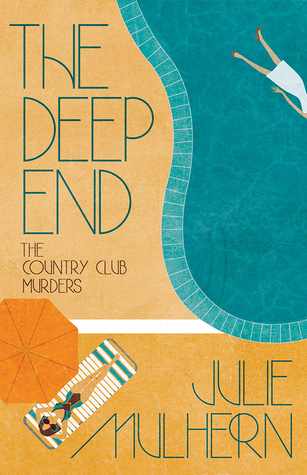 I’ve been trying to read more mysteries lately and it seems as though I’ve really been missing out on some things. The Deep End was one of those books that I saw on Amazon for $2, bought on a whim, and got hooked. This is the first book in The Country Club Murders series by Julie Mulhern. The sixth book in the series, Cold as Ice, was just published October 17th.
I’ve been trying to read more mysteries lately and it seems as though I’ve really been missing out on some things. The Deep End was one of those books that I saw on Amazon for $2, bought on a whim, and got hooked. This is the first book in The Country Club Murders series by Julie Mulhern. The sixth book in the series, Cold as Ice, was just published October 17th.
Set in 1974 Kansas City, MO, the book begins with Ellison Russell, a rather successful artist, who goes out for an early morning swim at the local country club, only to bump into the dead body of Madeline Harper (who happens to be her husband’s mistress). She would be the prime suspect for Madeline’s murder except that Ellison’s husband, Henry, has disappeared. Murder, blackmail, an overbearing mother, and country club secrets all surround Ellison as she tries to discover who the killer is while protecting her teenage daughter, Grace.
Mulhern does a good job at developing the mystery and the characters. In the beginning, Ellison seems like a fairly defeated character. She has her art, but is just waiting for Grace to graduate high school so she can divorce Henry. Throughout the book though, she starts to stand up and stop caring what her mother (or fellow country club members) think. Funny. Easy to read. Not quite a cozy mystery, there’s a bit of an edge to it with the slight references to Henry’s affairs. Borderline cozy?
Friday Reads; Nevernight by Jay Kristoff

Nevernight by Jay Kristoff
Nevernight by Jay Kristoff is dark fantasy, set in a world of manners reminiscent of 1700s Europe, and all that is bright and dark in that world. A gritty place of revenge by an underdog who should not be able to succeed, a school for assassins, a city built of the bones of a fallen god, where there is literally rarely a true night of darkness. All this makes the discord between the main gods seem…anticlimactic, normal or even anticipated. And of course, forbidden magic just to makes things more interesting.
Mia Corvere is ten when her father is part of a failed rebellion. He is hanged before her eyes. All of her family is dead or imprisoned, and she narrowly escapes death more than once, before becoming an apprentice assassin. Mr. Kristoff creates a very human character in Mia, and despite all she’s been through, and all she’s done, she’s still human. Both she, and her sidekick are smart mouthed, wry, and funny. Mr Kindly, a not-cat, shadow creature, has limitations, but aides Mia throughout. The author also contrasts the narrative of her early days with her teen years going to the Red Church of the Goddess of Night and Murder. The entertaining narrative is also accompanied by footnotes! And yes, please read the footnotes! Not only do you get back story, such as the dirt on the argument between the Goddess of Darkness and her Three eyed Husband of Light, but also more humor. Mia isn’t a hardened assassin, nor an action figure killing machine–(although, of course, to go through that punishment and keep on going….only in fiction & the movies!).
There is a lot going on in the book, who is the fallen god, really? Where did all the suns come from? Why do the shadows have such power, and whose side are they really on? While Mr. Kindly seems to be Mia’s familiar and friend, bonded at an early age, will he always be there for her?
This is definitely an adult book with blood, gore, murder, sex, etc. It is not Hogwarts. The reading may be slow for some, but if you got through Tolkien, this is no challenge.
And it’s only the first part! Godsgrave, is book two of the Nevernight Chronicle, to be finished in a third book.
[contact-form][contact-field label=’Name’ type=’name’ required=’1’/][contact-field label=’Email’ type=’email’ required=’1’/][contact-field label=’Website’ type=’url’/][contact-field label=’Comment’ type=’textarea’ required=’1’/][/contact-form]
Posted in Books & Reading
Tagged Dark Fantasy, Friday Reads, Jay Kristoff, Nevernight
Leave a comment
Friday Reads: Paperbacks from Hell: The Twisted History of ’70s and ’80s Horror Fiction by Grady Hendrix
There are two kinds of people in the world: people who would never read a book called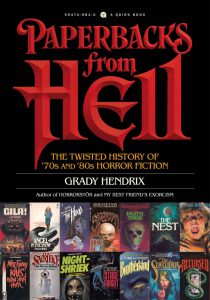 Satan’s Pets and my kind of people. For the latter, Paperbacks from Hell is a delight, a treasure trove of unseemly old horror novels from the days when skeletons were popular cover models and literally any animal could be cast as a monster.
Satan’s Pets and my kind of people. For the latter, Paperbacks from Hell is a delight, a treasure trove of unseemly old horror novels from the days when skeletons were popular cover models and literally any animal could be cast as a monster.
Grady Hendrix is building quite a name for himself as a genre fiction standout. He wrote Horrorstör, history’s greatest novel about a haunted furniture store. And then he wrote My Best Friend’s Exorcism, which he describes as “Beaches meets The Exorcist, only it’s set in the Eighties.” So we’re all pretty lucky that he found the time to compile this book and document the explosion of paperbacks that followed Ira Levin and William Peter Blatty’s surprise success.
It’s a long trek from Rosemary’s Baby & The Exorcist to Viking mummies & psychotic cows, and Hendrix navigates masterfully. If the only noteworthy thing about a book is a shark/grizzly bear fight, that’s all that’s mentioned. More worthwhile works get lengthier treatments and Hendrix maintains his sense of humor throughout. I suspect that it’s probably more enjoyable to read his witty synopses than most of the novels they describe. For example:
“[T]hough we all feel sympathy for the yeti who hates snow in Snowman, how many ski instructors will we allow him to decapitate before we hire a bunch of hunters and Vietnam vets to go after him with crossbows armed with tiny nuclear arrowheads?”
Yes! The proceedings are organized topically, so we spend time with killer clowns, critters, toys, Santas, and skeletons, the last being my favorites due to their assorted jobs. Even in this tiny niche of publishing history, there’s a lot of diversity and the only thing that really unifies these books is that they are all better than Paulo Coelho’s The Alchemist.
I’d recommend reading this in print, as it’s the best way to experience the garish covers that are reprinted here, and I’d also advise keeping a notebook handy—this book almost doubled my “to-read” list. A wildly fun read that’s perfect for pumpkin season.
Hendrix, G., & Errickson, W. (2017). Paperbacks from Hell: the twisted history of 70s and 80s horror fiction. Philadelphia: Quirk Books.
Friday Reads: A Little Life by Hana Yanagihara
 I read A Little Life by Hana Yanagihara all day and all night for a full weekend. After I returned it to the library I lay awake thinking about the characters in the story and what it all meant. While reading, I had to physically put the book down and take a break from the progressively horrible life that was inflicted on the main character.
I read A Little Life by Hana Yanagihara all day and all night for a full weekend. After I returned it to the library I lay awake thinking about the characters in the story and what it all meant. While reading, I had to physically put the book down and take a break from the progressively horrible life that was inflicted on the main character.
This book is written from the rotating point of view of Jude and several of his close friends. Jude doesn’t talk much about his past to his friends, but the reader is made aware of the damage inflicted upon him by the monsters in his past. You, dear reader, will barely be willing to believe the words on the page.
So why do I like this monstrosity of a book? The answer lies in the pure, face slapping truth in the book. Many books are about a character living through hell and learning to heal on the other side. This book is a reminder that not everybody makes it through to the other side. Bad things happen and sometimes there is nothing that can be done. Life is not all sunshine and happiness.
In A Little Life, Jude is nearly suicidal throughout most of the book. His friends care deeply but have no idea what to do. It is dark, gritty and unbearable at times. It is ‘set the book down and go to your happy place’ unbearable. Now think about this: the reader can set down the book and escape to safety. But there are people in the world who have no safety zone. Their world is so dark it would make no difference if they never opened their eyes.
Most people have never lived through hell. That is good. But for those who did, this book is a reminder that there are two options in life: you can close your eyes and stop breathing, or you can stand up and fight. Jude is partially on the way to healing at times, but there are entirely too many demons from the past waiting to drag him back into the shadows.
Jude’s story is not only for the downtrodden. A Little Life is also for the people who care about the downtrodden. If you have ever watched someone try to crawl out of the sewage rot that was their childhood, this book is for you. Read about where Jude’s friends went wrong. Read about how silence kills. Read about how it is not your fault if they slip back and drown in their own sewage infested mind. Healing is a choice that not everybody makes. Some people get out, but some will not.
This book is dark and only gets darker as you turn the pages. Many of you will hate and loathe this book. Most probably will not make it from cover to cover. That’s okay. This book is not for everybody.
But I need to tell somebody about this book. I hope this book reaches into a dark pit of misery and let’s somebody know they are not alone. I hope this book makes at least one person stand up and say ‘no more’. The demon does not get to win. Take control. Pack your bags and get out. With time and distance, the past loses power. Every time you stand up and speak, the past loses power.
It takes a few minutes to curl up and die. Survival takes a lifetime.
Friday Reads: Figures in Silk, by Vanora Bennett
 Figures in Silk, by Vanora Bennett, once again falls into my favorite genre to read: historical fiction. It is a glimpse into early Tudor history: not into life at court itself, but rather into the way that the political machinations affected and disrupted the lives of London’s ordinary citizens and particularly its powerful merchants.
Figures in Silk, by Vanora Bennett, once again falls into my favorite genre to read: historical fiction. It is a glimpse into early Tudor history: not into life at court itself, but rather into the way that the political machinations affected and disrupted the lives of London’s ordinary citizens and particularly its powerful merchants.
The year is 1471. Edward IV, who won the throne with the help of his brother, Richard, Duke of Gloucester, is restoring law and order after the long years of war during the War of the Roses. Under Edward IV, life in England begins to improve. Business is booming once more and the printing and silk industries prosper in London.
When silk merchant John Lambert marries off his two beautiful daughters, their fortunes are forever changed. Elder daughter Jane Shore begins a notorious liaison with the king while industrious and clever Isabel finds herself married into the house of Claver, a wealthy silk dynasty. Fate delivers Isabel a challenge when her new husband is killed and she is forced into apprenticeship to her mother-in-law, Alice Claver.
Isabel is already an accomplished embroiderer of silk in her own right, but it is from Alice Claver that Isabel learns all there is to know about the silk trade and its’ purchase from Italy, Persia, Spain, Tunisia, and beyond. Isabel learns to make her way in this new world of silk and forges a contract with her sister’s lover, King Edward IV. This new contract allows Isabel to bring silk production to London for the first time, and to hopefully break the monopoly that Venetian silk makers have over the silk trade.
As Isabel grows in power, and her plan for a silk industry run by Englishwomen is set into motion, the political landscape shifts in dangerous ways. One sister will fall as the other rises and choices must be made that will change their lives forever.
If you enjoyed Vanora Bennett’s first novel Portrait of an Unknown Woman, you will definitely enjoy Figures in Silk!
Posted in Books & Reading, General, Information Resources, Uncategorized
Tagged Friday Reads
Leave a comment
Friday Reads: My Italian Bulldozer by Alexander McCall Smith
Alexander McCall Smith is on a short list of my favorite authors. I adore his #1 Ladies Detective Agency, 44 Scotland Street, and Corduroy Mansions series, and when I visited Edinburgh a few years ago I made sure to visit 43 Scotland Street (there is no 44) and the Cumberland Bar just around the corner. I was delighted to be in the world of Bertie and all the adults he endures. Smith writes some standalone books too, and for me those have been hit and miss. My Italian Bulldozer is not part of a series and would be a wonderful way to introduce yourself to this author if you haven’t already made his acquaintance.
The title alone promises humor in a picturesque setting. Paul Stuart is a food and wine writer and his girlfriend of four years has just left him for her personal trainer. Paul’s editor, Gloria, sends him to Italy for personal respite and time to work on his next book featuring Tuscan cuisine. As a result of a rental car snafu, and a short bout in jail, he ends up borrowing a bulldozer. This slows him down considerably but it soon becomes apparent how handy a bulldozer can be in certain situations! The cast of characters he encounters are the true talent of Smith’s writing: the woman whose car is upended; the man who needs assistance digging a ditch; and anonymous townspeople who “borrow” the bulldozer from its public parking space. This small community is one that keeps track of everything and everyone and Paul quickly becomes a part of the comings and goings.
After rescuing the young American college professor in the upended car, there is chemistry between the two writers. Enter the ex-girlfriend, who shows up to apologize in person, with Gloria, the editor, arriving close behind. The events that follow may be predictable but I was more than pleased with the ending. I began thinking that I need to plan to a trip to Italy and wonder if these idyllic adventures really can happen in rural parts of the country as they have in so many of my favorite movies and books. This is a quick read and one that would be perfect to take on vacation, not terribly taxing and satisfying for all the senses.
Smith, Alexander McCall. My Italian Bulldozer. Pantheon; First American edition. edition, 2017
Friday Reads: Mansfield Park by Jane Austen
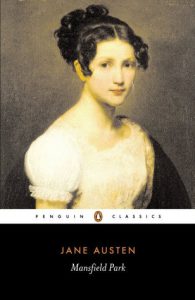 Until recently, I rated Mansfield Park as my second least favorite Jane Austen novel. For the record, Northanger Abbey is my least favorite of Austen’s completed works. I did not care for Mansfield Park because of Austen’s depiction of Fanny Price. Fanny is a poor relation taken in by her wealthy uncle, Sir Thomas Bertram. When Fanny first arrives at Mansfield Park, she is a scared and lonely ten year old. In many ways, she remains a frightened child, prone to low spirits and headaches. I disliked Fanny because she rarely offers an opinion or speaks her mind, is often judgmental and bursts into tears much too often for my liking.
Until recently, I rated Mansfield Park as my second least favorite Jane Austen novel. For the record, Northanger Abbey is my least favorite of Austen’s completed works. I did not care for Mansfield Park because of Austen’s depiction of Fanny Price. Fanny is a poor relation taken in by her wealthy uncle, Sir Thomas Bertram. When Fanny first arrives at Mansfield Park, she is a scared and lonely ten year old. In many ways, she remains a frightened child, prone to low spirits and headaches. I disliked Fanny because she rarely offers an opinion or speaks her mind, is often judgmental and bursts into tears much too often for my liking.
Throughout the novel, we watch Fanny’s family ignore her needs while assuming they know what’s best for her. Unlike many of her other characters, Austen allows Fanny to seethe with frustration, resentment and disappointment as they place their well-being before hers. While outwardly agreeable and meek, Fanny reveals she can be neither when refusing to marry the well-off Henry Crawford. Later the rightness of her decision is revealed when Crawford seduces and runs off with Fanny’s married cousin, Maria.
The last time I read Mansfield Park, I discovered there was more to Fanny Price than tears and moral rectitude. I still found her annoying, but I realized that Fanny enjoys the small pleasures that many of us take for granted. Walking with her cousin Edmund or listening to her brother’s stories fill Fanny with joy – she genuinely enjoys these moments. Her brother William’s impending visit, an outing to a neighboring estate and attending a ball thrown in her honor; all reduce her to tears. Yes, she is overwrought. I can’t imagine being so caught up in the moment that I weep with happiness. Yet, there is something appealing about Fanny’s willingness to embrace each and every moment life gives her. Perhaps this is Jane Austen’s greatest lesson.
Austen, Jane. Mansfield Park. New York: Penguin Classics, 2003.
Friday Reads: You Don’t Have to Say You Love Me, by Sherman Alexie
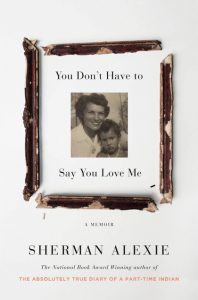 I am currently listening to the audio edition of You Don’t Have to Say you Love Me, a memoir by Sherman Alexie, written after his mother Lillian’s death in 2015. In it he wrestles not only with grief, but also with the regret, guilt, and bitterness that characterized his relationship with her.
I am currently listening to the audio edition of You Don’t Have to Say you Love Me, a memoir by Sherman Alexie, written after his mother Lillian’s death in 2015. In it he wrestles not only with grief, but also with the regret, guilt, and bitterness that characterized his relationship with her.
Born in 1966, Alexie grew up in Wellpinit, Washington, on the Spokane Indian Reservation. His family was poor, his dad often drunk and absent, his mother sober but sometimes cruel, and “On the reservation, violence [was] a clock, / Ordinary and relentless.” This is the formative experience that shapes all Alexie’s writing, but his power as a storyteller is his ability to craft a narrative both culturally specific and universal.
Speaking of the narrative, it is definitely not straightforward, and possibly not for everyone. The audiobook is read by Alexie, himself, which is a positive. He is known for his dramatic readings and has won slam poetry championships, so it’s doubtful any other narrator could own the material as he does. It has the feel of performance art, shifting seamlessly from prose with the texture of dramatic monologue, to poetry, to “rez accent” dialogue (Alexie recounts a conversation he once had with a white girlfriend, who said his mother had a “fancy accent.” When he tells her “[r]ez accents are the opposite of fancy,” she counters: “But rez accents make everything sound like music.”)
The stories Alexie tells aren’t presented chronologically, and even their authenticity is sometimes in doubt. In the first chapter alone there are multiple instances of family members questioning each other’s memories of how and if things happened. “You’re always making up stuff from the past,” his sister tells him. Even a writer friend teasingly accuses Alexie of being “the unreliable narrator of your own life,” for allegedly inventing a conversation between the two (about, of all things, storytelling and truth) and including it in the first chapter of his memoir. This is actually a perfect setup for Alexie’s subsequent examination of his relationship with his mother, a woman who told “many clever and clumsy lies,” as well as some that resonated with spiritual truth.
And that’s the thing about this memoir. Even if the anecdotes Alexie shares didn’t happen exactly as he remembers them, and even if one’s own life experiences and circumstances differ significantly from Alexie’s, the conflicted parental relationship he struggles with is recognizable and relatable, albeit uniquely described. That’s why I have appreciated this memoir so far and look forward to finishing it, though I don’t anticipate a particularly happy ending or any real resolution.
Alexie, Sherman. You Don’t Have to Say You Love Me. Ashland, OR: Blackstone Audio, 2017.
Friday Reads: The Swan Gondola by Timothy Schaffert
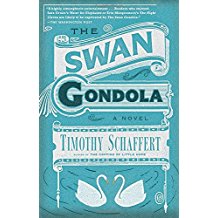 Timothy Schaffert’s The Swan Gondola has been on my reading list for the past few years. I’m now glad that I finally got around to reading it. It’s a delight. From what I knew about the book – not much – I expected it to be quirky, and it is, and in a good way.
Timothy Schaffert’s The Swan Gondola has been on my reading list for the past few years. I’m now glad that I finally got around to reading it. It’s a delight. From what I knew about the book – not much – I expected it to be quirky, and it is, and in a good way.
The setting is the 1898 Omaha World’s Fair (The Trans-Mississippi & International Exposition). The book is a love story populated with some of the most unusual and colorful characters imaginable. At the center is Ferret Skerritt, ventriloquist by trade, and a hopeful romantic. The object of his affection is the enigmatic and beautiful Cecily, an actress in a traveling troupe who plays Marie Antoinette in a fair horror show. And there is William Wakefield, a wealthy Omaha tycoon and fair investor who disrupts the Ferret and Cecily relationship.
Schaffert has an incredible imagination. His characters are finely developed, described as an endearing band of thieves and drunkards. Schaffert’s research for all things surrounding Omaha’s exposition in 1898 is thorough and admirable. He clearly did his homework and wrote his book with highly detailed descriptions of the society, culture, styles, and life near the end of the nineteenth century.
Schaffert’s fascination with the Wizard of Oz is notable and noted, mentioning such in the book credits.
Authors always earn my appreciation when they describe libraries and librarians in a positive light. And Schaffert does. He also gives recognition to a good number of Omaha librarians in the book credits, along with many others who contributed in one way or another to his research, writing, and eventual publication.
The Swan Gondola is Schaffert’s fifth novel. His earlier novels include the critically acclaimed Devils in the Sugar Shop and The Singing and Dancing Daughters of God. In addition to national recognition and awards, Timothy received the 2003 Nebraska Book Award (fiction) for his The Phantom Limbs of the Rollow Sisters.
Friday Reads: Raven Rock
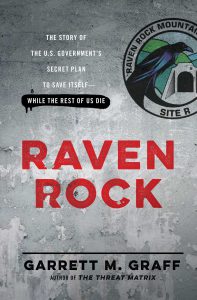 I had high expectations for Raven Rock: The Story of the U.S. Government’s Secret Plan to Save Itself—While the Rest of Us Die. I became interested in the book after listening to an engaging interview with the author, Garrett Graff, on NPR’s Fresh Air. Unfortunately, the book didn’t live up to my expectations. Don’t get me wrong, there is some good stuff here. But generally I found the middle part of the book to be a repetitive bore. Raven Rock picks up during World War II, when the U.S. was heading full throttle into the atomic age, with Harry S. Truman President of the United States. While there are many facets to Raven Rock, Graff primarily describes the aftermath of the atomic bomb deployment prior to the cold war, subsequent U.S. government preparations for doomsday, and other disaster planning. The book provides a chronology by each president after Truman. I found the first few chapters to be of interest (Truman and Eisenhower), then the beginning of aforementioned lackluster, drawn out, and sleepy sections, then heating up again around September 11, 2001 (Bush 43).
I had high expectations for Raven Rock: The Story of the U.S. Government’s Secret Plan to Save Itself—While the Rest of Us Die. I became interested in the book after listening to an engaging interview with the author, Garrett Graff, on NPR’s Fresh Air. Unfortunately, the book didn’t live up to my expectations. Don’t get me wrong, there is some good stuff here. But generally I found the middle part of the book to be a repetitive bore. Raven Rock picks up during World War II, when the U.S. was heading full throttle into the atomic age, with Harry S. Truman President of the United States. While there are many facets to Raven Rock, Graff primarily describes the aftermath of the atomic bomb deployment prior to the cold war, subsequent U.S. government preparations for doomsday, and other disaster planning. The book provides a chronology by each president after Truman. I found the first few chapters to be of interest (Truman and Eisenhower), then the beginning of aforementioned lackluster, drawn out, and sleepy sections, then heating up again around September 11, 2001 (Bush 43).
I think one of the challenges for Graff was getting his hands on information that wasn’t classified. This might explain why the reader has chapter after chapter devoted to the 50’s and 60’s time period, yet less than 2 pages devoted to President Clinton. Raven Rock, named after the massive Raven Rock Mountain Complex (also known as Site R), is an underground military nuclear bunker carved into the area’s greenstone granite, and located about 6 miles north of Camp David. It is basically an underground city, complete with offices, communications centers, bomb blast doors, dining facilities, an infirmary, bathrooms, etc. Speaking of Camp David, Graff provides an interesting narrative about the history of it (formerly known as Shangri-La). One of the appealing aspects of Raven Rock is these sorts of anecdotes, and I wish Graff devoted more attention to them. A few highlights include Graff’s descriptions of code names used for government officials and their family members, and the challenge to deciphering them on radio transmissions. Example: “Volunteer will reside at VALLEY for an indefinite time. I repeat: VOLUNTEER will reside at VALLEY for an indefinite time. VICTORIA requests that VENUS will go to VALLEY with agent” actually meant that Lyndon Johnson (VOLUNTEER) will reside at his private residence at The Elms (VALLEY), and Lady Bird (VICTORIA) requests that Luci (LBJ’s daughter, VENUS) will go to The Elms (VALLEY) with an agent. Also, the fact that up until at least 1910, tourists could sit at the president’s desk in the White House, and as Vice President, Lyndon Johnson’s phone number was listed in the phone book. Another anecdote describes a curious exchange between Chief Justice Earl Warren and officials who distributed a Mt. Weather entrance ID card to him but not Mrs. Warren. In our self-centered world of today, you have to appreciate the Chief’s returning the card, sarcastically saying:
“Then I suppose I should call my wife and say, ‘Honey, there is an atomic bomb attack to be made on Washington, and I am flying to safety in Appalachia. Sorry I don’t have time to come home and say good-bye, but it was nice to have met you.'”
Raven Rock is one of a number of emergency operations centers for the government, along with Mount Weather in Virginia, and Cheyenne Mountain in Colorado. But Graff’s Raven Rock is about much more than the construction and maintenance of these facilities; it’s about government disaster, succession, and “COG” or continuity of government planning — the principle that government continues to operate in the case of a catastrophic event. Granted most of this centers around the cold war, but on September 11, 2001, it took a much different turn. As Graff points out, September 11 exposed a clustered mess of communications problems and other assorted government disarray. Graff also devotes quite a bit of attention to the nuclear “football”. While the football doesn’t explicitly contain launch codes, “one military aide compared it to a Denny’s menu. You can go through and point at different pictures and that’s the type of nuclear war you would order. …”
All in all, Graff provides an interesting narrative of how the government’s plans have evolved over time to adequately handle these sorts of real and potential doomsday type disasters. Graff points out some of these failures along the way, but also interesting facts that most readers likely are unaware of. Just skip the middle third of the book.
